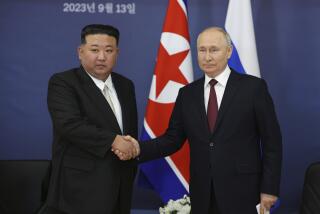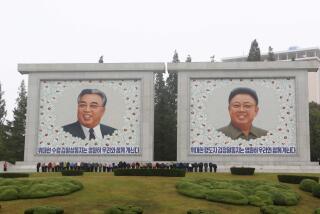Days after U.S. envoy’s trip to North Korea, U.N.-banned weapons are seized
- Share via
Reporting from Seoul — The weekend seizure of a 35-ton cache of reported North Korean-made weapons being transported through Thailand could complicate ongoing U.S. talks with the autocratic state to abandon its nuclear ambitions, South Korean analysts warned Monday.
Thai authorities, reportedly acting on a tip from U.S. intelligence, stopped a plane loaded with explosives, rocket-propelled grenades and parts for surface-to-air missiles as it made a refueling stop Saturday at Bangkok’s Don Muang airport.
Four men from Kazakhstan and one from Belarus were taken into custody. On Monday, they were ordered to remain in a Thai prison for 12 days pending further investigation, the Associated Press reported. They were charged with illegal arms possession.
U.S. special envoy Stephen Bosworth left Pyongyang, the North Korean capital, just last week after a three-day visit in which, he said, an understanding was reached on the need for the communist nation to return to the stalled six-party nuclear disarmament talks.
The weapons seizure demonstrates Washington’s determination to keep up pressure on North Korean leader Kim Jong Il as he ponders his nation’s nuclear future, Pyongyang watchers say.
After a North Korean nuclear test in May, the United States and its allies successfully lobbied the United Nations to pass a resolution banning the transport of war weaponry to and from North Korea. Thai officials were acting on that resolution when they confiscated the cargo of the Ilyushin-76 transport plane.
“This incident may act as a yellow card for North Korea, reminding it that the six-party talks are its only choice,” said Kim Yong-hyun, a professor at Dongguk University in Seoul. “The U.S. is reminding North Korea that the U.N. sanctions are still in effect.”
Analysts say the involvement of U.S. intelligence suggests that Washington has a two-pronged approach to North Korea: negotiations and stiff sanctions.
“If the weapons were uncovered because of information from the United States, it would mean that Washington is showing a strong will to hold on to talks and sanctions in parallel,” said Yang Moo-jin, a professor at the University of North Korean Studies in Seoul.
“We need to take a breath and see how both North Korea and the United States react to this. They are unexpectedly quiet.”
U.S. officials have reiterated since the incident that all U.N. member nations are expected to join in the sanctions to prevent the proliferation of North Korean conventional weapons as well as weapons of mass destruction.
North Korea has been widely suspected of violating U.N. sanctions by selling weapons to nations in Africa, Asia and Latin America -- using the profits to help sustain the impoverished regime.
In recent months, the U.S. and its allies have harassed North Korean ships suspected of illegally transporting arms.
The U.S. Navy in June shadowed a North Korean cargo ship possibly en route to Myanmar, forcing the vessel to return home.
In August, the United Arab Emirates seized a Bahamian-flagged ship carrying North Korean rocket-propelled grenades and other weapons labeled as machine parts. Also in August, India seized a North Korean ship off its coast. It found no weapons.
On Monday, newspapers in Seoul surmised that the weapons confiscated in Bangkok may have been bound for Sri Lanka, the Middle East or perhaps Russian underground-crime elements.
Thai officials said the plane was bound for Sri Lanka and then another location. They refused to comment on the cargo’s final destination.
Before the weekend incident, U.S. Secretary of State Hillary Rodham Clinton had described Bosworth’s Pyongyang trip as “quite positive.” It was the first official U.S. visit of the Obama administration.
She also stressed the need for “strategic patience” in dealing with Kim’s reclusive state.
Some say the plane’s capture days after Bosworth’s trip could try that patience. “For the short term, it might have a slight impact on the recent U.S.-North Korea conversations,” said Kim, the Dongguk professor.
He added that the incident, so close to the high-profile nuclear negotiations, could also signal North Korea’s desperate reliance on its arms sales.
“Arms shipment accounts for the biggest proportion of North Korea’s income,” he said. “Therefore, North Korea is implying that it cannot help but do this [unless it receives] international aid.”
Ju-min Park of The Times’ Seoul Bureau contributed to this report.
More to Read
Sign up for Essential California
The most important California stories and recommendations in your inbox every morning.
You may occasionally receive promotional content from the Los Angeles Times.














